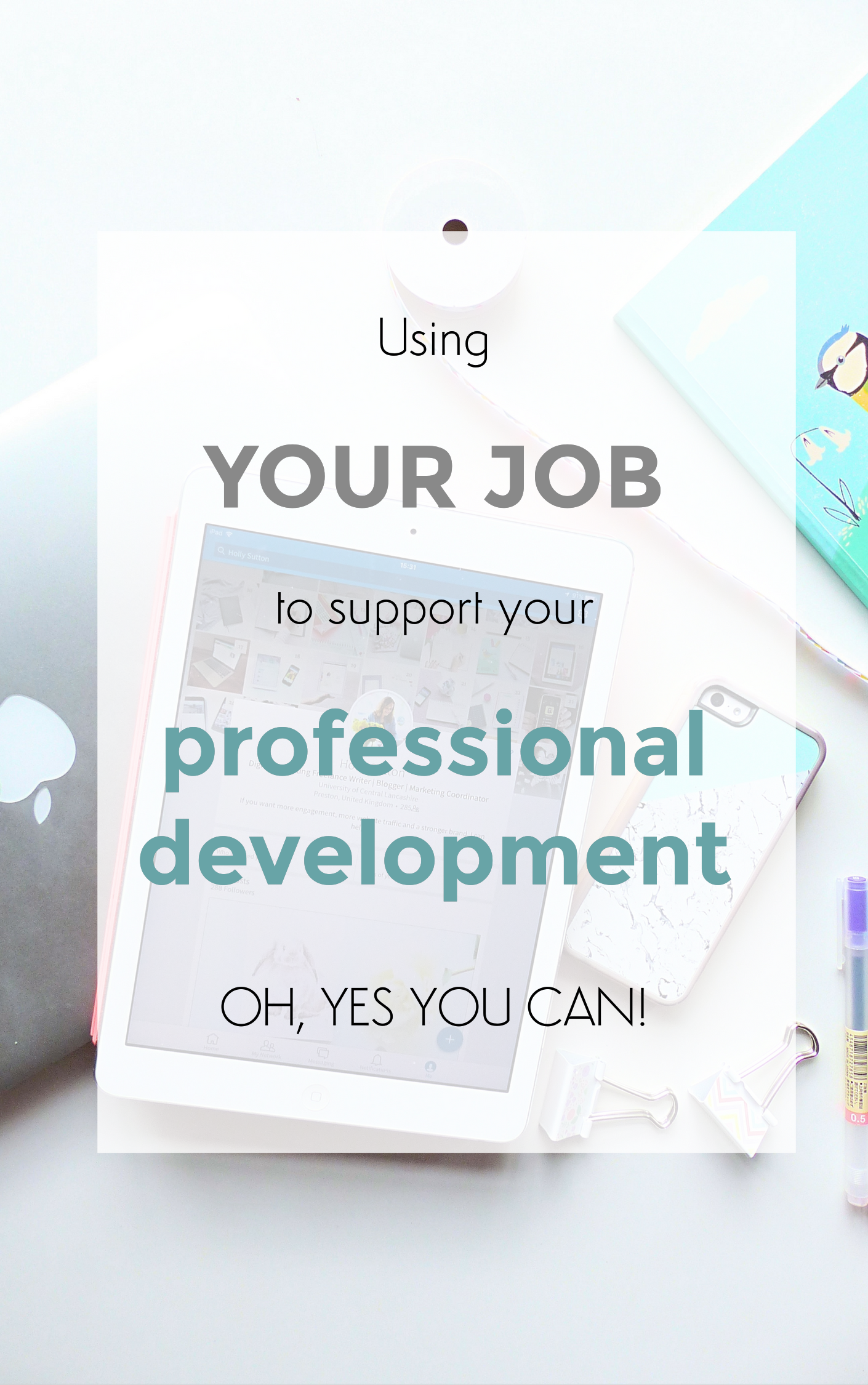USING YOUR JOB TO SUPPORT YOUR PROFESSIONAL DEVELOPMENT - OH, YES YOU CAN!
This is a guest post written by Stephanie from Communicate to Thrive.
You have more control than you think!
Do you have a day job that annoys you and gets in the way of your side hustle? The next time you have a mean case of the Sunday-night grumpies or daydream about how you will tell your boss you quit, you should remind yourself that you can make the most of your situation.
No, this doesn’t mean to tolerate a bad job while letting your dreams pass you by. Instead, I’m talking about figuring out how you can align your day job with your hopes, dreams and goals so that your job propels you forward instead of holding you back.
Figuring Out Your Professional Goals: Where Do You Want to Go?
To make the most of where you are, you need to figure out where you want to go. List out your professional goals. They can be huge, seemingly small, or anything in between. Some of you may already know what you want to do. You’ll want to list out your goals and think about the different steps that it will take you to get there.
For example, let’s say your goal is to run a social media management company. You might break that down to include learning more about different social media platforms, search engine optimisation, graphics, and developing social media strategies.
Or, instead of knowing with certainty what your goals are, you may be dancing at the edges or not really know what you want. It’s alright if you don’t have huge, overarching goals or even a specific next job in mind. Just start brainstorming.
Your list of professional goals could include:
1) Become a Photoshop pro
2) Start a marketing consulting business
3) Give a TED talk
4) Receive a bonus this year at work
5) Find a mentor
6) Get more responsibility working with clients at work
7) Develop an epic freebie for your blog
8) Volunteer with a nonprofit.
Writing this list will likely trigger new thoughts. The important thing is to give yourself the space to note what you are thinking. Take a first pass at the list and then step away from it. Revisit it until your“a-ha” moments and “what about this” questions ebb. You can organise the goals and make a note of those that speak most to your heart. Put a big star next to those! Then you can break them down into next steps.
Congratulations! You have a guide for your professional goals. No matter how specific or general they are, this list can act like a compass for you as you consider what will fulfil you and help you move forward professionally.
Using Your Job to Work Towards Your Goals: How to Get There
Now the fun part: figuring out how you can make the most of your job to achieve your dreams. Look at each goal and consider how it relates to your job. Be creative. You must connect the dots between what you want to achieve and what you do at your job.
Let’s take the example of gaining more experience in social media. Maybe you tweet and snap up a storm in your personal life, but you haven’t worked with social media as part of your day job. You want the experience of developing a social media strategy for a business and to learn more about social media’s impact on search engine optimisation.
Even if you don’t work on social media at your day job, what are the possibilities? Is it handled by another department? Is it handled at all? Perhaps you could volunteer to assist in a social media campaign, you could volunteer to draft tweets, or you could ask to shadow or provide input to the part of your company that works on social media. Keep digging and brainstorming until you come up with different strategies that will make your job work for you.
Then you have to get buy-in for your plan. The trick to having your boss agree to your request is to explain how it helps your company or manager directly.
Consider the difference between saying, “I really want more presentation experience so that I can ultimately give a TED talk. Can I please be considered for presentation opportunities?” versus “I know we have our upcoming all-hands staff meeting next month and that people are curious about our latest financial numbers. I’d be happy to present an overview of our end-of-year stats to answer all the questions that we’ve been getting. I can keep it brief and would run it by you first for your approval.” How could anyone refuse?
Explaining how what you want to do will solve the problems of your boss or your company is essential - especially if it’s a stretch from your current job. Let’s go back to the social media example.
Let’s say you’re in the IT department at a company, but you want to move into social media. The social media items are handled by the marketing department, and there is no overlap between your department and theirs! You could bridge the gap by saying something like:
“I’ve been hearing about amazing new tools to manage social media, and am wondering if our marketing department would like some ideas that could make life easier for them. Could I contact them and see if they could show me their workflow? Then I could suggest ideas that would make our social media efforts easier.”
This approach is particularly effective if you think of what drives your boss nuts and how your assistance will solve the problem.
Maybe your boss hates doing the quarterly report, and you want to gain experience in communications and analytics. You tell your boss that you’d be happy to investigate creating reports that will automatically send out the statistics and also you can develop a template for the report. Your boss will probably be amazed and delighted at the offer!
As long as you are presenting it so that you clearly show how it is in the best interest of your boss or the company, you have nothing to lose. You’re showing initiative and being a team player. The worst they can say is no. If you do hear no, don’t give up! Start with one concept, see what happens, and then continue to move down the list. You will eventually hit gold and get a yes.
a final note
Knowing that you are growing professionally and working towards your own goals is extremely empowering! You have more control that you imagine. You can make your job actually work for you.
How do you use your job to support your professional development? Let us know in the comments below!
Stephanie is a manager, writer, people-watcher, career success strategist, and workplace communication expert. She has managed people and projects at small businesses, startups, associations, nonprofits and the federal government. Stephanie currently manages a large Web site for the U.S. government. She created Communicate to Thrive to help people navigate office politics and learn how to thrive and advance at work. She lives in the Washington, DC area with her husband and three young children. Favourite sayings include: “Good food makes me happy” and “There are two types of people in this world: Those who know how lucky they are and those who have no idea how lucky they are.”


